Yes, You Can Get a Financial Life!: Your Lifetime Guide to Financial Planning
Rated 4.37 out of 5 based on 19 customer ratings
(19 customer reviews)
$14.30
Category: Investing & Wealth Strategies
Ben Stein wrote the original guide to this subject almost a quarter century ago. Now, Ben, along with Phil DeMuth, the eminent financial planner and writer, have gotten together to update the book, incorporating the massive changes that have occurred in the economy in the past 25 years.
This book tells you what and when to save, how much to save, what to save it in, when to spend, and when to say no to your present and yes to your future. Yes, You Can Get A Financial Life! is a time-traveling guidebook on how to organize the money side of your life for all of the decades of your life.
Contents:
- Personal Finance Over the Life Cycle
- Maximize Your Lifetime Wealth
- In Your 20s
- Saving and Investing in Your 20s
- Singles
- Housing for Married Couples and Singles
- How to Have Babies
- In Your 30s
- Saving and Investing in Your 30s
- A Word on Insurance
- Career Advice
- Single 30s
- Late 30s
- In Your 40s
- Investing, 40s-Style
- Single and 40
- In Your 50s
- In Your 60s and Beyond
Yes, You Can Get a Financial Life!: Your Lifetime Guide to Financial Planning By Ben Stein, Phil Demuth pdf
| Author(s) | |
|---|---|
| Format | |
| Pages | 260 |
| Publication Year | 2007 |
19 reviews for Yes, You Can Get a Financial Life!: Your Lifetime Guide to Financial Planning
Only logged in customers who have purchased this product may leave a review.
Related products
Rated 4.7 out of 5
$19.73
Rated 4.2 out of 5
$10.30
Rated 2.67 out of 5
$14.00
Rated 4 out of 5
$15.48
Rated 3.3 out of 5
$24.49
Rated 3.67 out of 5
$10.92
Rated 4.09 out of 5
$14.42
Rated 3.75 out of 5
$14.47

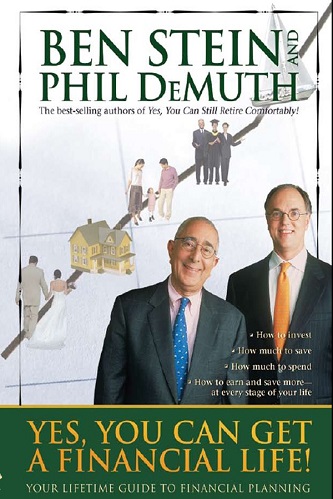
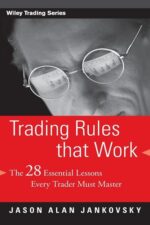
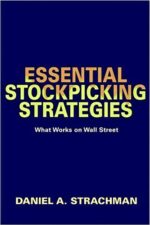
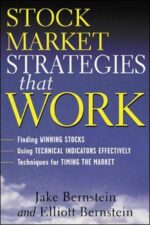

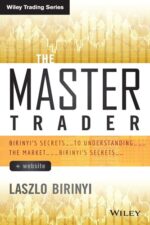



Eli Costa (verified owner) –
This book lays out a simple approach to starting and keeping up with financial planning for retirement. The best part about this book is that anyone, and I mean anyone can follow these steps easily. The book shows you where you should be, and how to get there for every 5 years of your life, starting at 25. This isn’t a make money fast type book, the opposite if anything. There is simple investment advice than anyone can follow, it even lists index mutual funds from Fidelity and Vanguard to help you out. It also shows simple allocations for your retirement for every decade of your life, including post-retirement.
Zayne Gibson (verified owner) –
The authors might argue that it’s never really “too late,” but the earlier in life you really comprehend what they are saying in this book, the better off you’ll be for the rest of your life.
This book, when properly used, forces you to not only acknowledge but to think about and ponder major expenses throughout your lifetime, and how best to prepare for them. Thinking of getting married and having children without any savings plan and dumping all of your paycheck into the best car/apartment/computer/whatever you can? You should probably think again. And this book will guide your thinking in logical directions.
Zora Mueller (verified owner) –
This book serves as a good overview of how all individuals should save for the major events of life – having children, buying a home and eventually retirement. The breakdown by decade and the charts indicating how much you should have saved by a particular age to meet your retirement goal make it easy to see if you are on track or not. The authors write in a sort of parental tone, not overly strict parents, but as parents trying to give you advice that will help you the rest of your life.
The authors focus mainly on retirement savings, but there is helpful advice on everything – mothers leaving the workforce to have children, life insurance, not overextending yourself to project a lifestyle you can’t afford, and how to pay for your children’s college (which they suggest the child do, they are acquiring an asset that will benefit them for the rest of their life and should be willing to pay for it).
I’d certainly recommend this book to anyone who feels they need a little guidance on financial planning.
Adonis Collier (verified owner) –
Neat book! Financial data is a little bit dated, no doubt up to date in later books. He covers financial planning from teenagers to retirees with the very best advise.
Albert Bartlett (verified owner) –
Ben Stein & Phil DeMuth’s Yes, You Can Get a Financial Life! is a practical, albeit, sarcastic book that is great for everyone from teenage on. While I don’t know enough about the ESPlanner software that they recommend (it was reveiwed recently in Money or Kiplingers and didn’t get outstanding support), the principles espoused within the first four chapters (see below) are insightful and in-step with the other publications and websites that I’ve seen for the middle class such as Fidelity’s NetBenefits & 401k.com, Hewitt’s Resources (Resources.Hewitt.com), Money (Money.CNN.com) and Kiplinger’s. I recommend this book especially for those with teens and wish that I’d had the benefit of this insight in my early years.
Bentlee Arellano (verified owner) –
This book is a little different than other books on personal finances. Instead of a rules and budget sheets it teaches principles on what to do and not to do to be successful financially. It guides you through each stage of your life from college age until deep into retirement. I would recommend reading this book and adding it to your personal finance library at any age. Below are the top ten principles in this book:
1. First increase your human capital by getting a solid education and developing excellent work habits, making connections, and cultivating a pleasant personality.
2. Then start saving for retirement as early as possible. Fund your 401K aggressively.
3. Next start saving for a house down payment.
4. Get and stay married to a sensible person.
5. Don’t try to show off by what you own, expensive cars, vacations, etc.
6. Work full-time, year-round, and acquire seniority; don’t hopscotch from one unrelated job to another unless you’re jumping a step up.
7. Don’t make any financial moves that will contribute to a divorce.
8. Make your children pay for their own college education. It is their asset they should pay for it.(Unless you are wealthy).
9. Don’t expect that you have a right to a certain lifestyle. You can only afford to live as well as your finances allow.
10. Don’t swing for the fences with your investments. Use low expense index funds. Stay invested through thick and thin.
This book would be a great gift to a high school or college graduate. Or to some one who just needs to get back on the correct financial track.
Jose Tate (verified owner) –
Judging by the quality and helpfulness of the books they write together, Ben Stein and Phil DeMuth are a great team. If you are interested in money, and everyone is, you will certainly benefit from their books. They have shown how, given enough time and discipline one can “time” the market (not by day trading), how to become a successful income investor, how you can get from wherever you are to a comfortable retirement, and now they provide us with a book for young people beginning their work lives. The financial life they describe begins with understanding what the workplace is about and how salaries should be viewed.
They begin by helping the reader view their income and expenditures (consumption) as a lifetime cycle. When we are young, we consume more than we make, but we are consuming our parents’ resources. At the mature end of our lives, we also want to consume more than we make because we want to retire. To make that happen, something has to happen during our working years other than buying everything we think we want or suppose we need. The authors point out that we cannot wish life would return to the way our parents knew it or as we dream it should becomes. “. . . we have to plan for life as it is today, not as it was yesterday.”
Once we can see the future as an economic life cycle, the authors give us some insights on how to maximize lifetime wealth. It is about getting an education in a marketable field that will keep you in demand rather than indulging yourself in an expensive college education (both in dollars and in years) that will not lead to gainful employment. Graduate school might even make some sense, if you use your education wisely. It has to do with being a good employee, of making and keeping great connections in life, of keeping your reputation and character in order so people will admire, trust, and recommend you to their friends and employers.
Stein and DeMuth then take us through life in decades. They take us through what work life will likely entail in one’s twenties, thirties, forties, fifties, sixties and provide a series of chapters on each decade. Then they provide a chapter on what one’s investment considerations are likely to be during that specific decade including the positives and the pitfalls. They also provide chapters for each decade on life as a married (with kids) or as a single (never married or divorced).
As they point out often, and they should, the key to having a real financial life where one can sleep at night and feel good about one has done for his or her family, is to get control of your finances early in life and to be disciplined about saving, spending, and work. Savings put aside early has the power of compounding and can weather the changes in the economy more easily than the same amount of money put aside later in life.
Learning to consume (spend) not only within one’s income, but within a realistic life economic plan will bring great rewards. Not only will you have the money you need, but as others see how you live they will admire you (yes, some will be jealous, but they won’t really matter that much), and employers will trust you. You will reap many dividends beyond the interest and capital gains your savings earn.
The chapter on how to have babies is particularly useful, because it deals with the whole parenting experience as it impacts your finances. Yes, we want our children to have the best life possible including the best education. However, there are serious implications about when your expenditures on their education will have the biggest impact on their life and your later life. Unless you are very wealthy, the authors recommend living where the public school system still works rather than spending their college money in k-12. And they view college as an earning asset that the child should have a share in paying for since they will be getting the benefit. One should not impoverish one’s later years when one will need money in serious ways and the child will likely take their schooling more seriously if they have a share in paying for it.
I also appreciate the way Stein and DeMuth talk about the way income likely will occur during your working life and what happens to most people in the workplace as they make changes to have children, as they age, and as their specialized knowledge that made them value becomes obsolete. This is material everyone needs to read and understand as they begin their career and as they go through these changes to get a handle on what is actually happening to a career they thought was on a one way ride to the stars.
The advice the authors give on retirement is quite sound. I also recommend that one get their “Yes, You Can Still Retire Comfortably” if you are far enough along that this is a serious consideration for you. These two books are quite powerful when read together.
Yes, I wish I had done better in my economic life. Most people do. Almost everyone makes mistakes and has setbacks, but knowing what should be done and what one should be aiming for has great power and is incredibly helpful to reorienting oneself after an economic body blow. Oh, and speaking of setbacks, the authors also have helpful discussions on insurance.
I recommend this book for you. For you to give to your children and even to a serious minded individual in his or her late teens preparing for college. But don’t just hand them the book. Make a plan to read chapters and have a lunch together to discuss what you have read. Let them disagree with the authors and explain why. Don’t rush to correct them, because the important thing is to keep them open and talking. If you shut them down you will not only not know what they are thinking, they won’t listen to you when you really want to help them and they need your help.
A terrific book. Strongly recommended.
Aubrielle Delarosa (verified owner) –
I like the overall message this book sends. Invest early and often in low cost index funds throughout your career. As a boglehead, I adhere to many of the principles suggested in this book.
There are a few points I strongly disagree with however:
1. Suggested asset allocation- Each person’s asset allocation (AA) is different. Most suggest a 20 something with roughly 80% stocks (some as high as 100%) and 20% bonds. More conservative folks believe the old adage “age in bonds”. Stein and Demuth suggest putting a large portion of your stock holdings in foreign markets. I agree that SOME of your holdings should be in a low cost international index, but their 40% (may not be the exact number, but close) is much too high, in my opinion. Somewhere closer to 20 or 25% would be better suited. Or take the opposite extreme, ala John Bogle, with no international funds whatsoever.
2. At several points in the book, the authors say if you reach a certain percentage of your salary by a certain age, you can stop contributing. What!? I’ve read numerous retirement books and this is the first that said it was OK to stop contributing. First off, if your employer offers a match, you should contribute at least that amount through almost any means necessary. Why would you pass up (literally) free money? Second, you are losing out on building up your funds for the future. Why would you do that? 3. This approach could easily lead to “lifestyle creep”. If you spend the money you would have saved for retirement, it will be that much harder later to save them. Best not to fall into that trap. I’d rather be way ahead of the game than step away from it for a while only to find out later that I’m now behind. Think of the lesson the tortoise and the hare taught us. Better to do it consistently than start, stop, and then start again.
3. Their asset allocation begins fairly aggressively (100% stocks if I remember correctly), but ends up with what I would consider fairly conservative. They allocate about 50% to bonds by the age of 50. It partially depends on when the person plans to retire, but with theoretically 10+ years to go, this seems rather high. This would be better suited for someone in their late 50s. When nearing retirement, I could see people sticking with the 50/50 approach or even moving to a 40 (stocks)/ 60 (bonds).
Overall, a good read for newer investors of any age with the caveats mentioned above. They tout low cost index funds and living within (or even below) your means, something people often need to hear again and again.
Kensley Reyes (verified owner) –
If you want to succeed in life, read everything these guys write!
Robin Berry (verified owner) –
product exactly as described. very satisfied.
Kade McKay (verified owner) –
Practical straight-forward talk. Better late than never. I’ve wasted so much time but not anymore. Thanks for the wakeup call to reality.
Ivory Barker (verified owner) –
I like how it progresses through various life stages. A good resource for a financial beginner and refresher for the more experienced.
Eden Sanders (verified owner) –
Excellent book for every young investor written with prose that will make you smile. Especially the comment about being “old enough to be an investor.”
Should be on every investor’s bookshelf.
Ryker Webster (verified owner) –
Was more about personality and less about Financial education. I do understand they are linked, but I think the book should be re titled.
Skye Case (verified owner) –
Basically, it’s a bible for anyone who believes in financial freedom.
Easy to read, lots of analogies and some good humor as well.
Great read, very mind blowing facts, overall I rate it 5 out of 5, there was a reason why my dentist recommended this to me.
Leanna Simon (verified owner) –
I think this book should be separated into three books. 20-30 year olds, 40-50 year olds and pre-retirement people.
Maxton Ventura (verified owner) –
I trully wish I had read this when I was in my 20’s, and not now that I’m almost 40. No one at home ever told me to save money, and I never had much common sense for money matters, so I barely disciplined myself to save money for any rainy day until my mid 30’s. I wish I had known better, but there’s no use for regrets now. I have always worked for companies or people that offered no benefits or retirement plans, etc. So I have to be more wise as to how I invest and put my money to work. As I said, I’m not a finances genius and barely can balance my checkbook, but thanks to this book and others I have read I can have a better idea as to how much to save and where to invest it.
The authors of this book give you good advice and hints as to how you should save and invest your money on each decade, as well as how to plan your retirement. If you haven’t started don’t fret, it’s better now than never. Start planning your finances today, no matter how old you are. It’s really worth doing so. It will help you sleep better, trust me!
Osiris Holloway (verified owner) –
I was reading the book while waiting for my daughter’s New Student Orientation and I found myself constantly asking her to read chapters, and quotes. Most readable, quality financial book I’ve come across. I think I’ll actually finish this one.
Luisa Dickson (verified owner) –
I buy a lot of financial books and use the info to fit MY life and lifestyle. Ben Stein is a favorite of mine because of his no nonsense style and the fact that he doesn’t mollycoddle his readers. Yes, he says, life can be hard, expect to suffer some financial blows, don’t be devastated by financial (or other) setbacks and…get on with it. Learn from your mistakes and keep upping your learning curve. This book certainly will help you gain some solid info.
This is the type of book that SHOULD be read by younger readers as well as those who are old enough to realize that they’ve made some financial mistakes or aren’t saving as much as they thought and need to make changes. Unfortunately, the younger readers aren’t getting the basics in school (Financial Literacy ought to be a required course – don’t get me started on that) and are subject to the usual mistakes of youth (consumerism and buying expendable items) but this book can certainly help all readers, if they have the sense to buy it – and at whatever stage of life they’re at – 20s, 30s, midlife, etc.
One final tip – If you use a credit card to buy this book or any books , pay off the debt as soon as possible, before you forget about it. Don’t end up paying high interest rates in order to try to gain financial “freedom”. I’ve noticed a lot of people seem to get in financial trouble and then spend a lot of money trying to “learn” how to get out of it. Avoiding credit cards with high interest rates as well as avoiding spending yourself into a huge hole of debt certainly helps. Just a thought.
But DO buy this book. It’ll pay for itself.